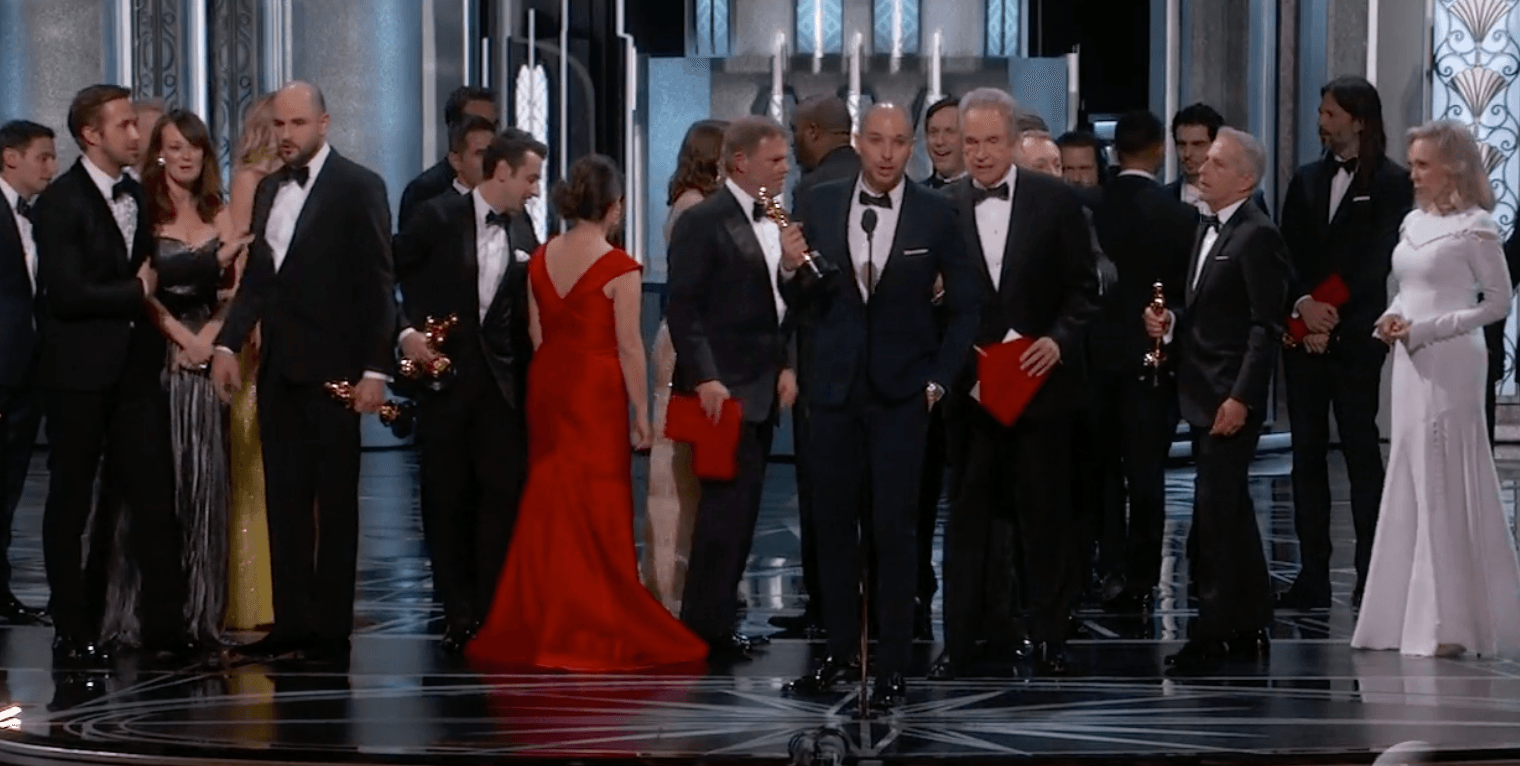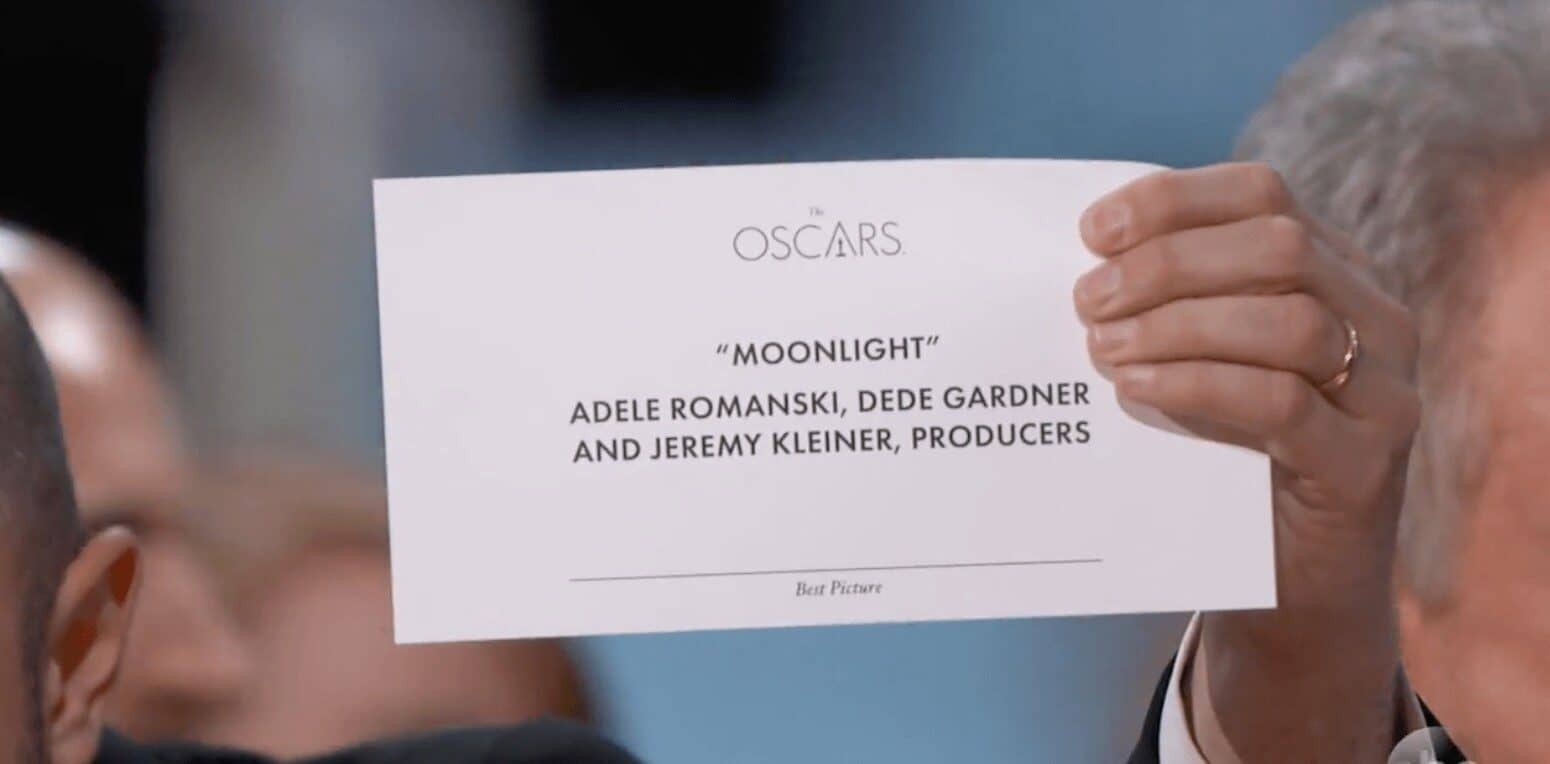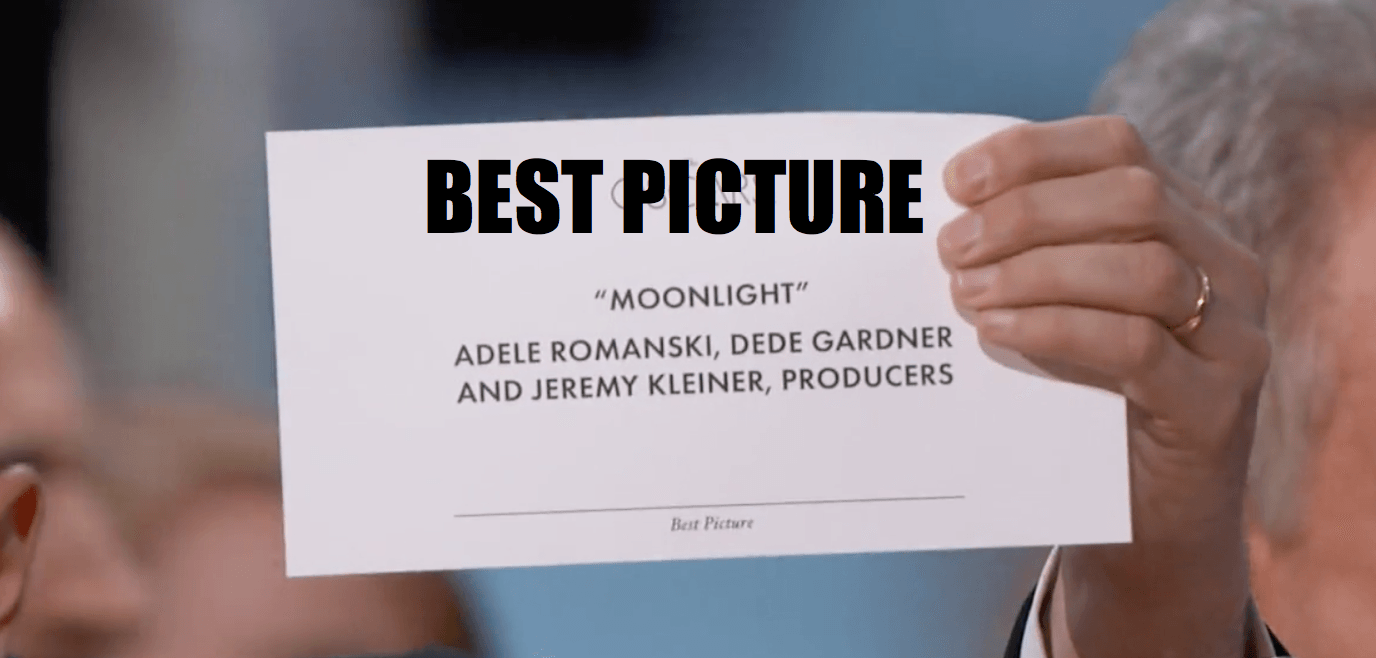Alternative headline: “Poorly Designed Card Trips Up Beatty and Dunaway at The Oscars.” Or “A Bad Process Beats Warren Beatty Every Time.”
I'm in the Los Angeles area for some consulting work the next few days. I was happy that traffic from LAX seemed light because everybody in this area was home watching the Academy Awards on TV, or so it seemed.
I was with a colleague in the hotel bar when the chaos surrounding the Best Picture announcement took place:
“Epic Oscars Mistake: Faye Dunaway, Warren Beatty Announce Wrong Best Picture Winner“
Ah, that headline illustrates the tendency to ask “who?” instead of “why?”
In the “Lean management” approach, with roots in Toyota, the thought process is to look at systems and processes, rather than jumping to blame individuals (see this post, for example, or these others). The late quality guru W. Edwards Deming taught this as well.
I'm sure you can find a video of this on YouTube.
What Happened?
Note: I wrote and updated this post about a dozen times over an hour as new facts and insights came to light. That's not unusual when doing “root cause analysis” or “process improvement.”
This Variety article has the video embedded, including the moment when the error was detected:
As this article says:
“There's commotion among the people standing behind him as a man wearing headphones appears and checks red envelopes being held by producers.”
Host Jimmy Kimmel asked, I think half jokingly,
“Warren, what did you do????”
Ugh, more blame!
Somebody else is heard saying, during the confusion, “They read the wrong thing.”
That's a factual statement.
But, if the emphasis is on “THEY,” it's a blame statement. The real question is why the “wrong thing” was in their hands. Don't blame Beatty and Dunaway…. blame the process. Who designed this process? PWC? The Academy?
PricewaterhouseCoopers has apologized, by the way. PWC says they will investigate. I hope they ask “why?” and “how?” more than “who?” The Academy did not issue a statement.
Beatty explains what happened:
In the hour since this happened, it seems clear that Beatty and Dunaway didn't misread the card… it seems like they had the wrong envelope.
I see two different red envelopes/cards on stage during the chaos that occurred when they discovered the wrong winner had been read:

This tweet suggests that Emma Stone's winner card wasn't handed to her (is that the normal process?):
But Emma Stone said she was holding her winner's card… so was there NOT a card on stage that said “Emma Stone” when Beatty and Dunaway read it? Or there was a duplicate? How confusing.
Perez Hilton tweeted that the accountants, PWC, always have two sets of cards. I wonder why?
Having to “make sure” you're giving the right card to a presenter is also an accident waiting to happen, just as if a hospital tells nurses to “make sure” they are giving the right medication to a patient. Proper error proofing makes it difficult or impossible to do the wrong thing. That's a matter of system design, not “being more careful.”
This same thing about the dual cards was confirmed by a Facebook friend from LA who works in the entertainment industry:
Problem Solving and Prevention
When a mishap occurs, the key in a Lean mindset is to figure out why and how the problem occurred and then put “corrective action” in place to prevent future occurrences. Healthcare is still learning how to get good at this process, so they don't repeat the same mistakes over and over.
When the actor Dennis Quaid's twins were harmed by medical error, it was the exact same problem that occurred at other hospitals before, but healthcare (as a whole) didn't do enough to prevent future occurrences. They eventually did change the medication packaging, which is a good example of systemic improvement.
In a Lean culture, we make it hard for people to do the wrong thing… it's called “mistake proofing” or “error proofing” (read more about this).
In the problem solving process, we might ask “who, what, when, where, why, and how” — but the “who?” is more about “who was involved?” or “who discovered the problem?” not “who screwed up?”
In some of the initial local news reports, I give them credit for thinking about preventing future mishaps like this:
Good problem solving would ask how this happened. Was the Best Actress card with Emma Stone's name really left up on the podium?
If Beatty and Dunaway were confused because they saw “Emma Stone” and “La La Land” instead of just a movie's name, I wonder why didn't “pull the andon cord” (as we'd say in the Lean approach) and ask if something didn't seem right… they were only on TV in front of a global audience, so I understand the hesitance to say, “Hey, something is confusing here.”
Another Lean guy asked the same thing:
A “Lean culture” makes it safe for people to speak up without fear of being blamed or embarrassed. But again, most of us don't have the pressure of working on live TV.
Beatty did explain that he was a bit confused when he looked at the envelope… “that's why I looked at Faye,” but he didn't directly ask the producers something for help.
Somebody on ABC later said, “He was intentionally delaying and hoping somebody off stage would come in and help.” Good theory. But, the help came too late (in a Lean culture, the help comes immediately when you have a concern).
This tweet says Beatty whispered “it says Emma Stone”:
When I rewatched it, Beatty pulls out a card, looks at it (realizing it's wrong?), and then looks in the envelope as if there was going to be another card in there… the right one?

Apparently, it was the “Best Actress” envelope that he was holding… oops, that's a process problem. How was that card even up there? Was it on the podium? Handed incorrectly to Beatty as they walked out?
Here is the card that was supposed to have been read:

As I tweeted, “Best Picture” is in very small text at the bottom of the card… not the best possible design. That's like putting a medication name in really small letters on a bottle… a bad idea that's prone to error.
I'm jumping to solutions without fully understanding the current state process. but I think there's less risk of somebody accidentally reading “The Emmy goes to…” on this night. It should say “BEST PICTURE” in really big letters on the top of the card perhaps.

If Beatty and Dunaway had opened an envelope with a card that said “BEST ACTRESS” on top, would it have been much clearer that it was the wrong card? I think so.
I saw a good question about why this process isn't more electronic. Would that make it easier to “error-proof” the process, or would that be prone to hacking?
What do you think? I won't be able to update this post during the day on Monday as more details come out, so feel free to post comments.
I wish I could be there at “the gemba” to help do proper root cause analysis and process improvement. I'd be happy to have The Academy hire me to help them with processes for 2018… :-)
Watching again, I see the confusion on Beatty's face that was hard to pick up on real time (and I was only half watching). It was a bit unfair to make Dunaway read the card, eh?
Are you able to use this mishap as a way of talking about errors, process, problem solving, root cause analysis, and problem prevention?
Scroll down to read updates and more thoughts in the comments section.
Related reading: Here is a post from a year later about their attempts to fix the process:
Please scroll down (or click) to post a comment. Connect with me on LinkedIn.
Let’s work together to build a culture of continuous improvement and psychological safety. If you're a leader looking to create lasting change—not just projects—I help organizations:
- Engage people at all levels in sustainable improvement
- Shift from fear of mistakes to learning from them
- Apply Lean thinking in practical, people-centered ways
Interested in coaching or a keynote talk? Let’s start a conversation.










On LA’s NBC 4 news this morning, they played a clip from a news story they aired yesterday.
A reporter interviewed the two PWC people who are “solely responsible” for the results.
The reporter asked what would happen if a mistake was made in reading a winner. The PWC guy, Brian Cullinan, said they would stop the show, make a correction, and clarify.
Maybe they should have put more thought into preventing the mistake?
FMEA (Failure Mode Effects Analysis) is a good method for anticipating what could go wrong and PREVENTING it:
More about PWC:
PricewaterhouseCoopers Brand Takes a Massive Hit
And
What Would Happen If A Presenter Announced The Wrong Winner At The Oscars?
Is being careful or triple checking ever as good as mistake proofing?
“It wasn’t Warren Beatty’s fault… he got the wrong envelope,” says the local news guy. I’m glad he isn’t getting the blame.
They’re also pointing out that it’s good that the error was pointed out and corrected immediately, rather than days later.
I feel bad for Beatty and Dunaway. It’s a shame that the “Moonlight” team had the focus and attention taken away from them in their shining moment, or what should have been.
I also agree that the La La Land team was incredibly gracious, considering what they were put through.
PwC in crisis meetings with Academy over 83-year contract following amazing Oscars blunder
You can’t win back that trust.
When talking about this with my client team today, somebody asked a good question:
When the wrong winner was read, the PWC people in the wings KNEW a mistake had been made.
Why didn’t they run out there to “stop the line” before the La La Land team got up there to start their speeches?
That sounds like a really slow response, especially considering how they had thought through what to do if the wrong name was made. I haven’t timed it, but was it 2 or 3 minutes before they “pulled the andon cord” in a proverbial sense?
From this article:
I don’t understand why they needed to confer. They should have both rushed out on stage, meeting in the middle, to say “Wait!” before the La La Land team was allowed up on stage.
And Beatty said this about the situation:
Here is the timeline from a video I rewatched:
0:27 announcement of “La La Land” by Dunaway
0:35 the announcer voice on the broadcast talks about La La Land having 14 nominations… the announcer doesn’t have a script designed around Moonlight for this? The announcer really doesn’t know the winners? Why can’t get an announcer they can trust with the results?
2:27 finally, producers or somebody comes out on stage
2:54 the announcement of “there’s a mistake”
More about the one PWC partner apparently being distracted before the moment he gave the wrong card to Warren Beatty:
PwC Partner at Oscars Tweeted Backstage Minutes Before Best Picture Mix-Up
PWC rep was told not to tweet during Oscars
Unlike some healthcare scenarios where a nurse or somebody is forced to deviate from a process due to understaffing, time pressure, etc., the PWC guy CHOSE not to follow the process (or direction from his company).
Oscars: Photos Show Accountant Tweeting Backstage Before Best Picture Flub
I’m just hysterical and laughing at all of the self righteous moronic idiots of Hollywood. The Oscar is nothing more than self appreciation of ‘look at me aren’t I gorgeous!’. The trouble is the moviegoer didn’t vote for any one actor. The Oscar is and will forever be group therapy for the participants seeking self worth. So when something goes wrong, you big shot Hollywood
Stars are all too quick to hang someone. Where’s love? Where’s the professionalism? All I see is hypocrisy… just proves you are all actors, incapable of real life situations. You people should try walking on water.
From this article:
As with many mistakes, there are many contributing causes, not just one single point of failure.
Great observations. It’s unusual how few pick up on these points. !We think alike.
So much in this situation mimics what happens in businesses all the time:
Mistake happens, no one notices until it is too late. Abbreviated investigation discovers WHO is at the source of the fatal flaw. Final conclusion: “human error.” Solution: “Pay better attention next time” or “Hire better workers.”
That is not the way Lean works. We carefully look at the combination of process and culture that caused the mistake. None of us have a view of all that goes on backstage… but I can only imagine:
Chaotic, messy, managers/workers running around, excitement, celebrities. Duplicate envelopes & briefcases (overproduction …. just in case… and both look EXACTLY the same). On top of that, a presentation culture that says, “read the contents of the envelope without hesitation and with personality …. even if you disagree or question the contents.”
Not an easy problem to fix, but the solution is definitely NOT “pay better attention next time.” I can imagine a (guarded) shadowboard on the wall backstage with a slot for every category envelope. The envelopes get removed from the wall and handed to the presenters. This way many people have visibility of where we are in the program and how many categories remain. If the managers feel more comfortable with backup envelopes, keep them hidden, in a locked box, and make them a different color so that everyone knows if there has been an error in the process.
Create a culture where presenters could question the results and ask for a confirmation. With a televised time-delay, the world audience would never have to know.
Find the root cause, discover waste, improve PROCESSES, create a problem-solving culture.
Thanks for the great comments, Brad.
I suggest the following visual references on each envelope to cue the preparers and presenters.
– Distinct Color Coding of envelopes for each award.
– Visual Icon (female or male mask for acting, director’s chair for directing, film scroll for editing, etc.)
– Alphanumeric code on the envelope for sequence and controlled document
– Orientation to producers, host, and presenters of what to do and how to respond if they get the wrong envelope (troubleshooting and rapid correction)
Good ideas!
Hi,
I personally watched the Osacrs, saw this going down and thought the same thing. I think we can try to avoid it as much as we can, but human error is almost inevitable. Even if we try to use lean tools such as Poka-yoke to avoid errors, there is always a percentage that something can go wrong. this is not only when it comes to people, but even machinery and robot. the only thing we can do is minimize the risks to its lowest rate possible and take the necessary actions to have a contingency plan in case something goes wrong. I do not see a way we can stop human error 100% even if we use the best tools and methodologies out there. Don’t you think so?
Thank you in advance for any input.
Maroua –
Thanks for your comment… great question. Just because we can’t prevent 100% of human error doesn’t mean we stop trying to improve processes and systems. The Oscars process clearly had a lot of gaps and weaknesses, so there’s much that can be done to make it better. The idea is to work toward perfection, not that we actually expect perfection.
I use this quote in training a lot:
“Human error is inevitable.
We can never eliminate it.
We can eliminate problems in the system that make it more likely to happen.”
Sir Liam Donaldson
WHO World Health Alliance for Patient Safety
Updates and other commentary:
Oscars 2017: Accountants Responsible For Best Picture Gaffe Will Never Work For Academy Again
I’m not surprised by this. That would be my decision too. On the one hand, they’re VERY unlikely to make that same mistake again, given the change. But still…
I’d fault the PWC people for 1) not having a good process and 2) not following their process plans (how to respond after the problem was identified). I wouldn’t necessarily punish somebody for getting a bad result that came from following the process.
Too often, in healthcare, people don’t follow the process and they still get a good result (they might be lucky). They weren’t lucky this time. That’s why you punish more for choosing NOT to follow the process.
In Defense of Warren Beatty at the Oscars
Yes, people need to stop blaming Beatty and Dunaway
Another perspective from “the gemba:”
The Oscars Stage Manager Tells All, Says He Was Stunned by PwC Accountant Incompetence
[…] https://www.leanblog.org/2017/02/oscars-embarrassing-preventable-error-process-improvement/ […]